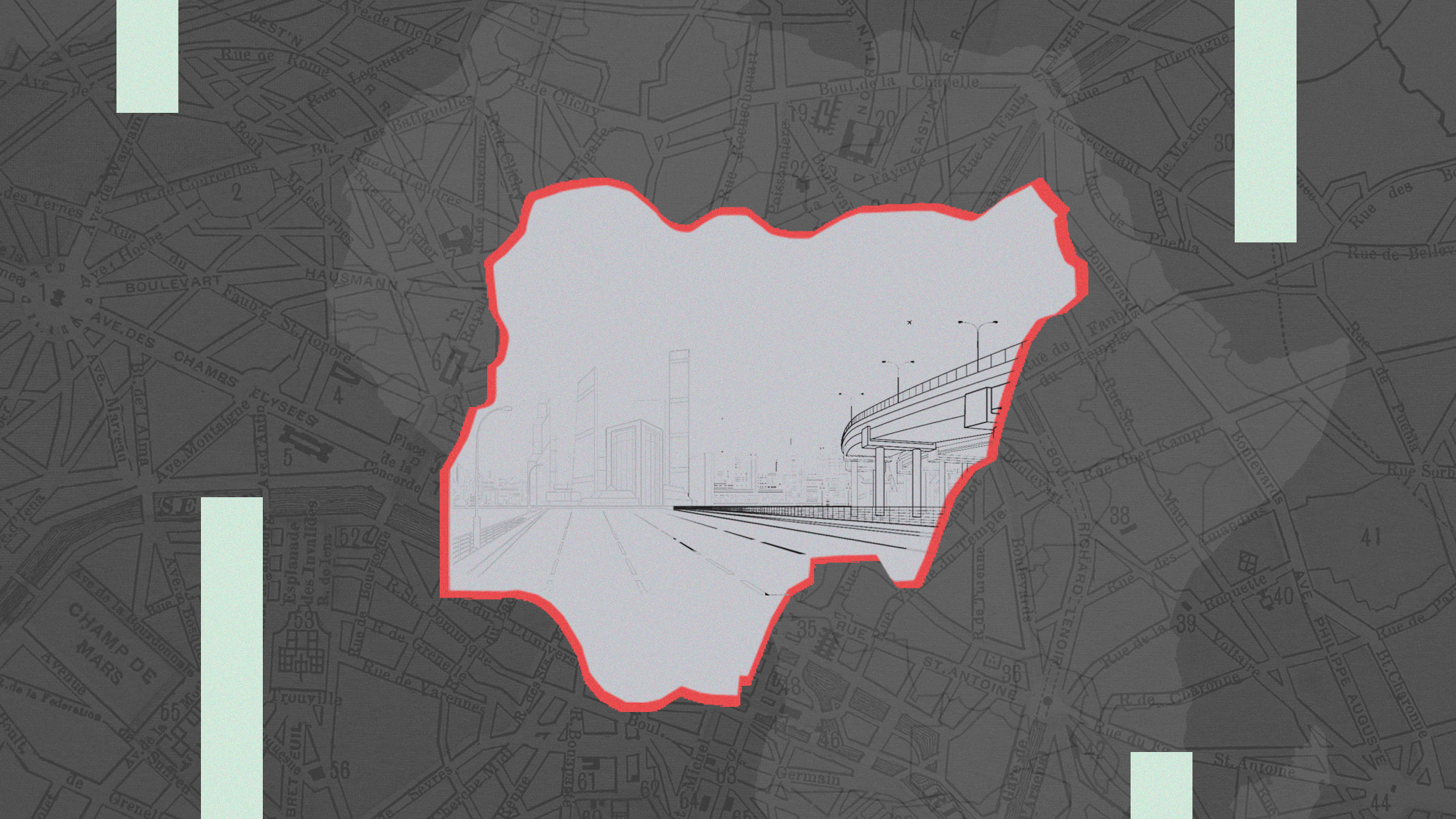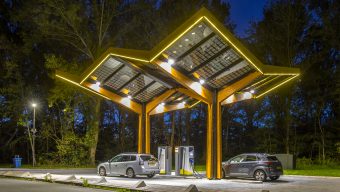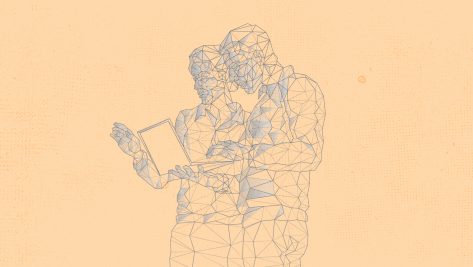Essay on Building A More Secure Nigeria Using Technology

- June 27, 2023
In today’s rapidly evolving world, technology plays a pivotal role in various aspects of our lives. One area where its potential is truly transformative is in enhancing national security. Nigeria, a nation with diverse challenges related to security, can leverage technology to address these issues effectively. By harnessing the power of technology, Nigeria can build a more secure and resilient nation, protecting its citizens, infrastructure, and resources. This essay explores the potential ways in which technology can contribute to building a more secure Nigeria.
- Enhancing Surveillance and Monitoring
One of the fundamental aspects of ensuring national security is the ability to monitor and detect potential threats. This is a crucial element in maintaining national security. By leveraging technology, Nigeria can significantly enhance its surveillance capabilities, enabling better detection and response to potential threats. Here’s a detailed explanation of how this can contribute to building a more secure Nigeria:
- Closed-Circuit Television (CCTV) Cameras
CCTV cameras are widely used in surveillance systems to monitor public spaces, critical infrastructure, and high-risk areas. By strategically deploying CCTV cameras throughout cities and vulnerable locations, law enforcement agencies can have a comprehensive view of potential security incidents. These cameras can capture real-time video footage, which can be monitored centrally or by security personnel on the ground. In the event of an incident, such as a crime or act of terrorism, the footage can provide valuable evidence for investigations and aid in identifying perpetrators.
- Facial Recognition Software
Facial recognition software is a powerful technology that can automatically identify individuals by analyzing their facial features captured on camera. Integrating facial recognition technology with existing surveillance systems can enhance Nigeria’s ability to identify and track persons of interest, such as known criminals or wanted suspects. When a person’s face matches a record in a database, an alert can be generated, allowing law enforcement agencies to take immediate action. This technology can help prevent crimes, detect potential threats, and assist in investigations.
- Unmanned Aerial Vehicles (UAVs)
Unmanned Aerial Vehicles, commonly known as drones, have become increasingly popular for surveillance purposes due to their ability to reach remote or inaccessible areas. UAVs equipped with cameras and sensors can provide aerial surveillance, enabling authorities to monitor vast areas, borders, and critical infrastructure. Drones can capture high-resolution imagery or video, allowing for detailed analysis and identification of potential security breaches. They can also be used for rapid response, surveying disaster areas, and monitoring large public gatherings, providing real-time situational awareness.
The enhanced surveillance and monitoring capabilities offered by these technologies can bring several benefits to Nigeria’s national security:
a. Crime Prevention and Deterrence
Visible surveillance measures act as a deterrent to criminal activities. Potential offenders are less likely to engage in unlawful behavior when they know they are being monitored. CCTV cameras in public spaces, combined with facial recognition technology, can help identify and track individuals involved in criminal activities, acting as a deterrent and assisting law enforcement in preventing crimes before they occur.
b. Rapid Response and Incident Management
Real-time monitoring and analysis of surveillance footage allow authorities to respond quickly to security incidents. In the event of a crime, act of terrorism, or public disturbance, law enforcement can receive immediate alerts and deploy resources to the scene, minimizing response times and improving incident management. The availability of detailed video footage can aid in understanding the sequence of events and provide evidence for subsequent investigations.
c. Situational Awareness
Surveillance technologies provide a comprehensive view of the security landscape, enabling authorities to maintain situational awareness. By monitoring CCTV cameras and utilizing UAVs for aerial surveillance, law enforcement agencies can identify potential threats, such as suspicious activities or gatherings, and take proactive measures to address them. Improved situational awareness allows for more effective resource allocation and decision-making, enhancing overall security outcomes.
d. Investigation and Prosecution
Surveillance technologies provide valuable evidence for investigations and prosecutions. The recorded video footage from CCTV cameras can be reviewed and analyzed to reconstruct events, identify suspects, and strengthen criminal cases. Facial recognition software can assist in matching suspects to known individuals, aiding in the identification and apprehension of criminals. This evidence can be presented in courts of law, leading to higher conviction rates and improved deterrence.
- Improved Border Security
Border security is a critical aspect of national security, particularly for a country like Nigeria, which shares borders with several neighboring countries. Technology can play a vital role in strengthening border controls, preventing illegal activities, and safeguarding Nigeria’s territorial integrity. Here’s a detailed explanation of how improved border security using technology can contribute to building a more secure Nigeria:
- Biometric Systems
Implementing biometric systems at border crossings can enhance identity verification and authentication processes. Biometric technologies, such as fingerprint and iris recognition, provide a highly accurate and reliable means of identifying individuals. By capturing and comparing biometric data of travelers against national and international databases, border security officials can quickly identify potential threats, such as wanted criminals, terrorists, or individuals using fraudulent identities. This helps prevent unauthorized entry and enhances border control efficiency.
- Advanced Sensors and Surveillance Equipment
Deploying advanced sensors and surveillance equipment along the borders can provide real-time monitoring and detection of security breaches. Technologies like radar systems, thermal cameras, and motion sensors can detect suspicious activities, such as illegal border crossings, smuggling, or trafficking. These sensors can trigger alarms or alerts, enabling border security personnel to respond promptly and apprehend individuals involved in illicit activities. Additionally, the data collected by these sensors can be analyzed to identify patterns and trends, enhancing intelligence-led border security operations.
- Remote Monitoring and Border Surveillance
Technology allows for remote monitoring of border areas, including remote or difficult-to-access regions. By utilizing CCTV cameras, UAVs, or satellite imagery, authorities can continuously monitor border areas, detecting any unusual or suspicious activities. This remote monitoring capability increases the effectiveness and coverage of border security operations, enabling authorities to respond rapidly to potential threats. The real-time information obtained from remote monitoring can be shared with relevant agencies, allowing for coordinated response efforts.
- Integrated Information Sharing Systems
To strengthen border security, it is crucial to have effective information sharing systems among various border control agencies and international partners. Technology facilitates the integration and sharing of data, enabling seamless collaboration and communication. Integrated systems can provide border security officials with access to relevant databases, including watchlists, criminal records, and visa information, ensuring comprehensive background checks on travelers. This helps in the identification of high-risk individuals and prevents their entry into the country.
The implementation of improved border security using technology brings several benefits to Nigeria’s national security:
a. Preventing Illegal Activities
By deploying biometric systems and advanced surveillance equipment, Nigeria can significantly reduce the incidents of illegal border crossings, smuggling, human trafficking, and the infiltration of criminals or terrorists. The use of biometrics ensures accurate identification, reducing the chances of individuals using false identities or fraudulent documents to gain entry into the country. Advanced sensors and surveillance equipment enable early detection of suspicious activities, allowing for swift intervention and prevention of illegal acts.
b. Protecting National Resources
Effective border security ensures the protection of Nigeria’s natural resources, including oil, minerals, and wildlife. Smuggling and illegal activities often exploit these resources, causing significant economic losses and environmental degradation. By leveraging technology, Nigeria can monitor and safeguard its borders, preventing unauthorized extraction, smuggling, and illegal trade of valuable resources. This contributes to the country’s economic stability and preserves its natural heritage.
c. Countering Transnational Crimes
Improved border security using technology enhances Nigeria’s ability to combat transnational crimes, including drug trafficking, arms smuggling, and terrorist activities. By implementing robust biometric systems, authorities can identify and apprehend individuals involved in these illicit activities. Real-time monitoring and remote surveillance help detect and intercept suspicious movements along the borders, disrupting criminal networks and preventing the cross-border flow of illegal goods and individuals.
d. Facilitating Legal Trade and Travel
Efficient border security measures create a conducive environment for legal trade and travel. By streamlining border control processes through the use of technology, Nigeria can facilitate legitimate cross-border movements, boosting economic activities and regional integration. Automated systems, such as e-gates and electronic visa systems, can expedite the entry and exit processes for authorized individuals, enhancing trade facilitation and tourism.
- Data-Driven Intelligence
Data-driven intelligence refers to the utilization of technology and advanced analytics to collect, analyze, and interpret data for the purpose of enhancing national security. By integrating various data sources and applying sophisticated algorithms, Nigeria can gain valuable insights into security threats, patterns, and trends. Here’s a detailed explanation of how data-driven intelligence can contribute to building a more secure Nigeria:
- Integration of Data Sources
Data-driven intelligence requires the integration of diverse data sources, such as social media feeds, satellite imagery, public records, law enforcement databases, and sensor networks. By combining these different data streams, Nigeria can create a comprehensive intelligence framework that provides a holistic understanding of security situations. Integration enables cross-referencing and analysis of data from multiple angles, revealing hidden connections and patterns that may not be evident when examining individual data sources in isolation.
- Advanced Data Analytics
To extract meaningful insights from the integrated data, advanced analytics techniques can be applied. Machine learning, data mining, and predictive analytics algorithms can uncover patterns, correlations, and anomalies within the data. By analyzing historical data, Nigeria can identify trends, modus operandi of criminal groups, and emerging threats. Predictive analytics can help anticipate potential security incidents, allowing for proactive measures and resource allocation.
- Early Warning Systems
Data-driven intelligence can facilitate the development of early warning systems that detect and predict security threats. By continuously monitoring data streams and applying real-time analytics, Nigeria can identify warning signs or indicators of potential security incidents. This can include monitoring social media for keywords related to terrorism or tracking changes in patterns of criminal activity. Early warning systems enable security agencies to take preventive actions, minimizing the impact of threats and enhancing public safety.
- Intelligence-Led Operations
By leveraging data-driven intelligence, Nigeria can shift towards intelligence-led operations. Traditional security approaches often rely on reactive measures, responding to incidents as they occur. However, with data-driven intelligence, security agencies can proactively identify and disrupt potential threats before they materialize. By utilizing predictive analytics, intelligence agencies can prioritize resources, target operations, and allocate personnel based on the identified risks and areas of concern.
The implementation of data-driven intelligence brings several benefits to Nigeria’s national security:
a. Enhanced Situational Awareness
Data-driven intelligence provides a more comprehensive and accurate understanding of the security landscape. By analyzing integrated data sources, Nigeria can gain real-time insights into security threats, criminal activities, and emerging patterns. This improved situational awareness allows security agencies to make informed decisions and respond effectively to changing security dynamics.
b. Proactive Decision-Making
With data-driven intelligence, decision-makers have access to evidence-based insights that support proactive decision-making. By identifying trends, hotspots, and potential risks, security agencies can allocate resources, deploy personnel, and implement preventive measures in a targeted and efficient manner. This proactive approach can prevent security incidents, disrupt criminal networks, and minimize the impact of threats.
c. Targeted Investigations and Operations
Data-driven intelligence enables targeted investigations and operations. By analyzing patterns and correlations within the data, security agencies can identify individuals or groups involved in criminal or terrorist activities. This focused approach improves investigation efficiency, increases the likelihood of successful prosecutions, and aids in dismantling criminal networks. Intelligence-led operations can prioritize high-risk areas, disrupt illicit activities, and enhance public safety.
d. Collaboration and Information Sharing
Data-driven intelligence promotes collaboration and information sharing among different security agencies, both domestically and internationally. By integrating data sources and establishing secure information-sharing platforms, Nigeria can enhance coordination, exchange critical intelligence, and facilitate joint operations. This collaborative approach strengthens the country’s ability to tackle cross-border crimes, terrorism, and other transnational security challenges.
- Cybersecurity Measures
In today’s digital age, cybersecurity is a critical component of national security. As Nigeria becomes increasingly connected and reliant on technology, it is crucial to strengthen cybersecurity measures to protect sensitive information, critical infrastructure, and the overall digital ecosystem. Here’s a detailed explanation of how strengthening cybersecurity can contribute to building a more secure Nigeria:
- Cyber Threat Intelligence
Establishing a dedicated cyber threat intelligence framework is crucial for proactive cybersecurity measures. Nigeria can develop capabilities to collect, analyze, and share information about emerging cyber threats, vulnerabilities, and attack patterns. This intelligence can help identify potential targets, tactics, and actors involved in cyber attacks, enabling authorities to take preventive measures and strengthen defenses. Sharing cyber threat intelligence with international partners and collaborating with cybersecurity organizations can further enhance Nigeria’s ability to detect and respond to cyber threats.
- Incident Response and Cyber Defense
Building a robust incident response and cyber defense capability is essential to mitigating the impact of cyberattacks. Nigeria should establish dedicated cyber response teams that are trained to handle and respond to cyber incidents promptly. These teams can employ best practices in incident response, conduct forensic investigations, and collaborate with law enforcement agencies to identify and prosecute cybercriminals. Implementing proactive defense measures, such as continuous monitoring, threat hunting, and vulnerability assessments, can help identify and remediate security weaknesses before they are exploited.
- Cybersecurity Awareness and Education
Promoting cybersecurity awareness and education is vital to developing a cyber-resilient society. Nigeria should invest in public awareness campaigns, educational programs, and training initiatives to educate individuals, businesses, and government entities about cybersecurity best practices. By fostering a culture of cybersecurity awareness, Nigeria can empower its citizens to adopt secure behaviors, recognize potential threats, and take proactive measures to protect themselves and the nation’s digital infrastructure.
- Public-Private Collaboration
Collaboration between the public and private sectors is crucial in combating cyber threats. Nigeria should foster partnerships and information sharing between government entities, businesses, and cybersecurity organizations. This collaboration can facilitate the exchange of threat intelligence, sharing of best practices, and joint efforts to develop and implement effective cybersecurity measures. Public-private collaboration can leverage the expertise and resources of both sectors to enhance the overall cybersecurity posture of the country.
The implementation of strong cybersecurity measures brings several benefits to Nigeria’s national security:
a. Protection of Sensitive Information
By strengthening cybersecurity measures, Nigeria can safeguard sensitive information, including government data, personal records, and financial transactions. Protecting this information from unauthorized access, data breaches, and cyber espionage ensures the privacy and security of individuals and organizations. It also prevents the potential misuse of sensitive data for malicious purposes that could harm national security.
b. Defense against Cyber Attacks
Enhanced cybersecurity measures enable Nigeria to defend against cyber attacks, such as ransomware, distributed denial-of-service (DDoS) attacks, and advanced persistent threats (APTs). By implementing robust security controls, conducting regular security assessments, and maintaining up-to-date defense mechanisms, Nigeria can detect, block, and mitigate cyber threats in real-time. This proactive defense posture strengthens the resilience of critical systems and reduces the potential impact of cyberattacks.
c. Protection of Critical Infrastructure
Securing critical infrastructure is crucial for maintaining national security. Cyberattacks on critical infrastructure, such as power grids, water supply systems, and transportation networks, can have severe consequences for public safety and the economy. By implementing strong cybersecurity measures, Nigeria can protect these vital systems from disruption, unauthorized access, and sabotage, ensuring their reliable operation and minimizing their vulnerability to cyber threats.
d. Economic Stability and Trust
A robust cybersecurity ecosystem fosters economic stability and trust. By demonstrating a strong commitment to cybersecurity, Nigeria can attract foreign investments, stimulate economic growth, and promote digital innovation. Strong cybersecurity measures inspire confidence among businesses and consumers, encouraging the adoption of digital technologies and facilitating secure e-commerce transactions. This, in turn, contributes to the overall development and prosperity of the country.
- Enhancing Law Enforcement Technologies
Enhancing law enforcement technologies is a key aspect of building a more secure Nigeria . By equipping law enforcement agencies with advanced tools and technologies, Nigeria can improve crime prevention, detection, and response capabilities. Here’s a detailed explanation of how enhancing law enforcement technologies can contribute to building a more secure Nigeria:
- Advanced Surveillance Systems
Deploying advanced surveillance systems, such as closed-circuit television (CCTV) cameras, drones, and license plate recognition systems, can enhance law enforcement’s ability to monitor public spaces, identify suspicious activities, and investigate crimes. These technologies provide real-time situational awareness, aid in the prevention of crimes, and provide valuable evidence for investigations. The data collected by surveillance systems can be analyzed to identify patterns and trends, enabling law enforcement agencies to deploy resources strategically.
- Predictive Policing
Utilizing data analysis and predictive analytics, law enforcement agencies can develop predictive policing models . These models leverage historical crime data, socio-economic factors, and other relevant variables to identify high-risk areas and times for criminal activities. By focusing resources and patrols in these areas, law enforcement can proactively prevent crimes and allocate resources more efficiently. Predictive policing can help law enforcement stay ahead of criminals and reduce response times to criminal incidents.
- Geographic Information Systems (GIS)
Geographic Information Systems (GIS) can assist law enforcement agencies in visualizing and analyzing crime data in spatial context. GIS technology enables the mapping of crime hotspots, crime patterns, and resource allocation. By identifying crime-prone areas, law enforcement agencies can prioritize their efforts and allocate resources effectively. GIS can also assist in crime scene analysis, traffic management, and disaster response, enhancing overall operational efficiency.
- Mobile Technologies
Equipping law enforcement personnel with mobile technologies, such as smartphones, tablets, and mobile applications, can significantly improve their effectiveness and response capabilities. Mobile devices enable officers to access real-time data, communicate and collaborate with colleagues, and quickly access critical information while in the field. Mobile applications can provide tools for incident reporting, evidence collection, and crime analysis, streamlining law enforcement workflows and improving operational efficiency.
- Digital Forensics
Digital forensics tools and techniques play a crucial role in investigating cybercrimes, gathering digital evidence, and prosecuting offenders. Law enforcement agencies can enhance their digital forensics capabilities by investing in specialized software, hardware, and training. Digital forensics can help in the recovery of deleted or encrypted data, the analysis of digital devices, and identification of cybercriminals. Strengthening digital forensics capabilities is essential to combating cybercrimes, fraud, and other technology-related offenses.
- Communication and Information Sharing
Efficient communication and information sharing among law enforcement agencies are vital for effective crime prevention and response. Implementing secure communication systems and information-sharing platforms can facilitate real-time communication, collaboration, and intelligence sharing among different agencies and departments. This enhances coordination, enables a holistic approach to crime-solving, and supports interagency operations.
The implementation of enhanced law enforcement technologies brings several benefits to Nigeria’s national security:
a. Crime Prevention and Detection
Advanced surveillance systems, predictive policing, and mobile technologies enable law enforcement agencies to prevent crimes and detect criminal activities more effectively. Real-time monitoring, data analysis, and proactive patrolling contribute to reducing crime rates and enhancing public safety. With enhanced technologies, law enforcement can identify patterns, deploy resources strategically, and take proactive measures to prevent criminal activities.
b. Improved Investigations and Prosecutions
Law enforcement technologies, such as GIS and digital forensics, assist in investigations and evidence collection. GIS helps in visualizing crime data, identifying connections, and allocating resources efficiently. Digital forensics tools aid in the extraction and analysis of digital evidence, leading to successful prosecutions and convictions. These technologies enhance the efficiency and effectiveness of law enforcement operations and contribute to the justice system.
c. Enhanced Operational Efficiency
Equipping law enforcement personnel with mobile technologies streamlines operational workflows and improves efficiency. Real-time access to information, communication capabilities, and mobile applications enable officers to respond quickly, make informed decisions, and collaborate effectively. This results in optimized resource utilization, faster response times, and improved overall operational efficiency.
Enhanced law enforcement technologies support collaboration and information sharing among different agencies and departments. Secure communication systems and information-sharing platforms enable seamless sharing of critical intelligence, situational updates, and operational data. This collaborative approach enhances interagency cooperation, promotes a coordinated response to security threats, and facilitates joint operations.
In conclusion, enhancing law enforcement technologies is essential for building a more secure Nigeria. By deploying advanced surveillance systems, utilizing predictive policing models, leveraging GIS and mobile technologies, strengthening digital forensics capabilities, and promoting communication and information sharing, Nigeria can improve crime prevention, detection, and response capabilities. These technologies empower law enforcement agencies to be more proactive, efficient, and effective in ensuring public safety and maintaining national security.

Related Posts
Related tags.
- Essay Topics
- Essay Writing
Students Mirror
Students Mirror is an educational blog for Teachers and Students
Leave a Reply Cancel reply
You must be logged in to post a comment.
You May Also Like

Essay On Fuel Scarcity in Nigeria
- July 1, 2023

Write An Essay On Traditional Marriage In Nigeria
- November 2, 2023

Essay On Armed Robbery In Nigeria
- August 5, 2023

Essay On A Place Of Interest I Visited In Nigeria
- November 3, 2023

Essay On All That Glitters Is Not Gold
- June 23, 2023

How I Spent My Christmas Vacation Essay (1500 Words)
- June 4, 2023

Essay On Building a More Secure Nigeria Using Technology
Nigeria is facing many security problems that need new and clever solutions. This essay will talk about how using technology can help make Nigeria safer. With the power of technology, Nigeria can protect its people, keep its important places safe, and make sure everything runs smoothly.
Table of Contents
Making a More Secure Nigeria Using Technology Essay
Cctv surveillance: watching over us.
Putting up lots of CCTV cameras can make Nigeria safer. These cameras can watch public spaces, like streets and markets, and important places, like airports and power plants. CCTV cameras show what’s happening in real-time, and they can stop bad things from happening. If something does go wrong, they can help catch the people responsible.
Drones: (adsbygoogle = window.adsbygoogle || []).push({}); Flying Guardians
Using drones for watching and checking can make Nigeria even safer. Drones have special cameras that can see things from high up, and some can even see heat. Drones can fly over big areas and show us what’s happening in places that are hard to get to. They can help keep an eye on borders, watch crowds of people, and help during emergencies like floods or fires.
Biometrics: Special Codes for Safety
Using special codes like fingerprints or face recognition can make sure only the right people can get into certain places. Biometrics are super safe and fast. They help make sure bad people can’t pretend to be someone else. This is important for places like banks, where important stuff is kept, or for letting the right people into important government buildings.
Cybersecurity: Protecting the Digital World
Keeping things safe in the online world is really important too. Nigeria needs strong walls and locks to keep bad people out of its computer systems. This is called cybersecurity. It’s like having a superhero guard that protects all the important information in the country. With good cybersecurity, Nigeria’s money, records, and important stuff can stay safe from hackers and bad guys.
Collaboration and Learning Together
Using technology to make Nigeria safer needs everyone to work together. This means the government, companies, and even other countries should help each other. People need to learn how to use technology in the right way to keep Nigeria safe. This means training people to use drones, watch CCTV cameras, and protect computer systems from bad people.
Conclusion: A Brighter and Safer Future
Using technology is a big step towards making Nigeria safer. With CCTV cameras, drones, biometrics, and strong cybersecurity, Nigeria can be ready for anything. But it’s really important to work together, learn how to use technology, and make sure it’s used in the right way. With all these things together, Nigeria can be a safe and secure place for everyone.

Hello! Welcome to my Blog StudyParagraphs.co. My name is Angelina. I am a college professor. I love reading writing for kids students. This blog is full with valuable knowledge for all class students. Thank you for reading my articles.
Related Posts:

Leave a Reply Cancel reply
Your email address will not be published. Required fields are marked *
Save my name, email, and website in this browser for the next time I comment.
- Where We Work

Nigeria Digital Economy Diagnostic: A Plan for Building Nigeria’s Inclusive Digital Future
Story highlights.
- A new World Bank diagnostic provides a snapshot of the state of Nigeria’s digital transformation, and provides recommendations for future growth
- The report notes that while Nigeria has made some progress, strategic investments and innovations are needed to reach its full digital potential
- The diagnostic is part of the World Bank Group’s Digital Economy for Africa Initiative in support of the African Union’s digital transformation agenda
ABUJA, November 28, 2019 – Nigeria is capturing only a fraction of its digital economic potential and will need to make strategic investments to develop a dynamic, transformative digital economy, according to a new World Bank assessment.
The Nigeria Digital Economy Diagnostic says that with improvements in digital connectivity, digital skills, digital financial services and other core areas of digital development, Nigeria can fully unleash new economic opportunities, create jobs and transform people’s lives.
“As the biggest economy in Africa with one of the largest populations of young people in the world, Nigeria is well-positioned to develop a strong digital economy, which would have a transformational impact on the country,” said Isabel Neto, World Bank Senior Digital Development Specialist and co- author of the report. “Through innovations and investments, the Nigerian economy can harness digital data and new technologies, generate new content, link individuals with markets and government services, and roll out new, sustainable business models.”
The report provides an assessment of the state of the country’s digital economy around the five pillars of the Digital Economy for Africa initiative (DE4A); digital infrastructure, digital platforms, digital financial services, digital entrepreneurship and digital skills—key foundational elements of a digital economy. The report also offers specific, actionable recommendations to the government and stakeholders to further its development of each pillar. The DE4A is part of the World Bank Group’s support for the African Union’s Digital Transformation for Africa, which aims for every African person, business and government to be digitally abled by 2030.
In Nigeria, the digital economy is a key priority, as the report notes, the country has made some strides to strengthen the country’s digital space. Nigeria’s Economic Recovery and Growth Plan 2017–2020 (ERGP) recognizes the need for a digital-led strategy to make the Nigerian economy more competitive in the 21st century global economy. In 2015, the Nigeria Communications Commission proposed the transition of the economy into a digital economy through investments in digital infrastructure, and more specifically broadband, which is a key driver of digital economy growth. Nigeria’s international connectivity is well developed, and there are new digital platforms available such as the Central Portal for Government Services. Nigeria is also committed to universal education, including providing digital skills training, and it is home to several high-growth digital companies.
“There is a vibrant ecosystem of digital entrepreneurship in Lagos and Abuja that is supported by the dynamic incubators, venture capital companies, digital start-ups and the diaspora,” said Siegfried Zottel, World Bank Senior Financial Sector Specialist and co-author of report. “However, the growth of digital firms is not without challenges, such as a difficult business environment, lack of early-stage financing, and limited market opportunities outside of those cities, which would need to be addressed.”
Additional challenges and recommendations include:
- Improve digital infrastructure: Despite having the largest mobile market in Sub-Saharan Africa which is supported by strong broadband infrastructure and improved international connectivity, Nigeria has minimal fixed broadband infrastructure and connectivity in rural areas, leaving a significant number of the most marginalized segments of the population without internet access.
- Strengthen digital platforms: Strong public and private digital platforms support the provision of digital services and a thriving eCommerce platform. However, millions of Nigerians lack formal identification records to access a range of public and private services.
- Increase access to digital financial services: About 60 million Nigerian adults are without access to a formal account, stalling the country’s journey toward financial inclusion. Whereas in other African markets financial inclusion would mostly be driven by digital financial service (DFS) providers, in Nigeria the huge potential of DFS still remains untapped.
- Improve the policy environment for digital entrepreneurship: Despite its large, youthful, and entrepreneurial population, digital entrepreneurship is yet to be fully exploited given its potential to become an engine of economic transformation in Nigeria.
- Close the digital skills knowledge gap: The capabilities and skills required to use various forms of digital technologies remain limited to a small segment of the population. Increases in higher level education and the existence of accessible online training initiatives is bringing digital skills to those able to access them. However, low enrollment in basic education and the poor quality of that education coupled with a lack of digital skills in curricula is segmenting digital skills into a slim share of the population, excluding the poorest from the benefits of the digital world.
- Report: Nigeria Digital Economy Diagnostic Report
- Press Release: Nigeria’s First Digital Economy Diagnostic Reveals a Vibrant Entrepreneurial Ecosystem but Rural Areas are still without Internet Access
- IFC Impact Story: Digital Growth Drives Nigeria’s Economy Forward
- Watch: Connecting Africa Through Broadband: A Roadmap for Inclusive Growth
- Watch: All Africa Digital Economy Moonshot
- The World Bank and Digital Development
- The World Bank and Competitiveness
- The World Bank and Financial Sector
- The World Bank in Nigeria
- The World Bank in Africa

- The Dowen Difference
- Meet the Team
- Vision and Mission
- School Policies
- Parent’s Partnership
- General Principles
- Our Curriculum
- Academic Awards & Support Group
- Co-Curricular Activities
- DCL Code of Conduct
- Scholarships
- Admission Procedure
- Entrance Assessment
- Upcoming Events
- 25th Anniversary Celebration Picture Highlights
- Student Corner
- NewsLetters

BUILDING A MORE SECURE NIGERIA USING TECHNOLOGY

Adaobi Iris Egwim
Dowen College Lagos. April 21, 2021
On regular basis we are horrified by stories of kidnapping of students and adults alike, even in ruran communities. We listen with shock news of gunmen breaking into banks and destroying the ATMs, we often hear of killings and robberies along the highways and in residential estates.
People no longer feel safe to move around especially in the nights or go by road when travelling home away from the cities. People who can afford it, use armed escorts when moving around, thereby spending money that they could use for the family good or other purposes. Many business offices and residential estates have armed policemen on guard. A lot of people now fly planes at high costs and are also forced to follow the schedules of the airlines. During festive periods such as Christmas, many families stay back in the cities rather than take the risk of exposing themselves to criminals.
The law enforcement agencies such as the Nigerian Police Force and Nigerian Civil Defence Corps are not very well equipped to respond fast enough and confidently to these problems, as a result, the crime rate has continued to rise in the country. Many people believe that most security problems in Nigeria are the result of inadequate prevention measures to eliminate security risks, and inadequate methods for identifying the criminals, tracking them and arresting them.
Some of the technologies that can help build a more secure Nigeria include CCTV, Drones, Biometrics and Cybersecurity technologies.
Closed Circuit Television (CCTV), according to Wikipedia, also known as video surveillance, is the use of video cameras to transmit a signal to a specific place, on a limited set of monitors. They are cameras mounted at selected strategic points within and around a buildings, store, office, malls, recreation parks, schools and road junctions. They can be mounted in banks and other areas that require attention. Some of these cameras have audio ability.
The CCTV cameras are usually connected to a viewing screen in the security office, it is also possible to view the displays remotely on mobile phones. With this technology, security staff can have a view of and monitor many locations at the same time and from one location. They can then respond faster by moving staff to deal with the matter or communicate through an intercom. Some the CCTV systems have motion detectors which send alerts to security staff when movement is detected within the areas that they are monitoring. Such technology will help especially where the internet network for streaming camera videos is not available or not enough.
CCTVs can also be connected to doorbells for improved security and can be made to be part of automatic doors in homes.
Drones are remotely operated flying devices that have camera attached to them. The cameras are then monitored by the controller on the ground. Drones have many applications for security purposes, they can be used by the Police to track the movement of criminals either on the run or driving away from a location of crime. Drones can be flown over remote places where Police or soldiers or search teams may have difficulty reaching such as hills, rivers, densely populated areas and extensive grassland. With special night cameras they can also be used at nights and in dark places. Also, because they are just devices, no life will be lost even if criminals shoot at it.
A technology that is becoming common and very useful for security use is Biometrics. Biometrics is defined in Google as the application of statistical analysis to biological data. Biometrics, particularly fingerprinting technologies are technologies that use the characteristics of the finger to identify individuals specifically. No two persons’ fingerprints are alike therefore this technology will have no error in confirming a person to be the right person.
Fingerprinting technology can be used to give access into offices, homes, cars or even to withdraw money. That way, the use of keys or cards can be reduced or eliminated. Keys and cards are objects that can be stolen or duplicated by criminals. At times, they may be misplaced or lost and fall into the hands of criminals who can them use them to impersonate the real owners and carry out criminal activities. With fingerprint technology, this risk can be avoided.
Cybersecurity is another important area of technology that will improve security in the country. With widespread use of the internet, there is also is the widespread risk of cyberthreats. According to Marysville University Online, cybersecurity is the protection of internet connected systems such as hardware and data from cyberthreats. The practice is used by individuals and enterprises to protect against unauthorized access to data centers and other computerized systems.
These technologies that can detect and block intruders to the home or business internet network are becoming better. Hacking is a major problem that the internet is facing and will continue to face in the future, this is mainly because almost everything runs on the internet, banks, government agencies, research agencies, military locations, schools, hospitals etc. These become easy targets for hackers who can then access and steal or alter confidential information and data. Cybersecurity technologies and the training of skilled professionals to manage them should be given greater attention in order to protect the future of businesses as well as government and public institutions in the country.
Another important technology that will help combat security challenges is reliable mobile communication technology for the police force and other law enforcement agencies. Many times, police are not able to manage security because they are not equipped properly to track down criminals. On our highways there are very many checkpoints but communication between them on one hand and between them and the police stations on the other hand, are not always available or dependable. This results in the situation where criminals can drive past ten checkpoints without being arrested. The criminals are aware of this weakness and take advantage of it to get bolder and commit more crimes. The Police force requires modern communication devices with GPS capabilities.
Police hot lines, similar to 211 used in the Lagos must be reliable throughout the day and night, and should be uniform nationwide. That way, when someone dials the emergency hotline, immediate police response should be guaranteed. This should also be coordinated with other emergency services such as ambulance and fire services.
With these technologies, amongst many others, the security situation in Nigeria will be greatly improved.
Leave a Reply
Click here to cancel reply.
Your email address will not be published. Required fields are marked *
ABOUT THE SCHOOL
We are a co-educational day and boarding secondary school with over 20 years record of excellence.
GET IN TOUCH
Designed by elskaveda
© 2020. All Rights Reserved.
This will close in 20 seconds

- IE Corporate Relations
- IE University

Nigeria’s Digital Future Will Be Decided by Physical Infrastructure
Nigeria’s aim to become a digital powerhouse requires investment in physical infrastructure, and modular approaches driven by indigenous innovation offer a pathway to do this.

Practically any conversation about business opportunity in Nigeria reverts to the same theme: digital technology is the future but the infrastructure to support it is poor.
We cannot yet talk about the digital revolution as if we have already all become avatars in a world devoid of physical objects. Bricks and mortar are still the foundations of the modern economy, even if we foresee a digital future. Even as we migrate from the physical to the digital world, we need electricity to power our homes and equipment, roads to transport goods, and schools to train youths to be able to navigate and exploit this digital future. The physical and digital must work in dynamic synergy, not in mutual isolation. The potentials are huge but can only be fully realized if we bridge the digital divide.
Nigeria’s lack of access to affordable energy, straightforward logistics, and a deep skill pool not only limits how digital technology can be deployed but also makes the country less competitive in deploying it. The digital divide, the phenomenon of the wealthy disproportionately accessing the benefits of digital technology, is well documented and understood to be growing: According to an assessment by UNCTAD in 2021 , citizens of developing countries are at risk of becoming providers of raw data to global digital platforms, while having to pay for the intelligence obtained from data they have generated.
Conversations about closing the digital divide often focus on steps that can be taken to protect data, develop digital skills, and improve broadband access. However, what Nigeria should also focus on is this relationship between the digital and the physical world. The country needs investment in physical infrastructure for its citizens to fully access the benefits of digital technology. In other words, digital inclusion must be a key priority of Nigerian governments at all levels. The ideal of digital inclusion, underpinned by the three key principles of access, adoption, and application, encompasses activities through which disadvantaged groups have access and use ICTs to enable them to fully participate in society and enjoy benefits and opportunities like other citizens. There is therefore a need for significant investment in infrastructure. According to the World Bank, for example, Nigeria needs to invest $3 trillion by 2050 in order to provide all the infrastructure the economy needs to maximize its potential. but how do you about this in a vast and diverse country like Nigeria?
Modular approaches can complement large-scale infrastructure investment plans.
Unfortunately, it is unlikely these solutions are going to come from large-scale infrastructure projects in the short or even medium term. State budgets in Nigeria and elsewhere are over-extended and infrastructure investment in Nigeria comes with risks that very few investors have the appetite to take on.
Yes, investment at a massive scale is needed; however, because there are such high barriers to implementation, it is urgent to explore alternative models to building physical infrastructure that will make Nigeria more globally competitive.
A modular approach, where infrastructure-related challenges are identified and ideas are generated, explored and tested at a community or organizational level are one way to do this. By focusing problem definition from the bottom up, rather than top down, it can be easier to anticipate and respond to project bottlenecks that might delay or change scope. This type of approach can also be effective at building local capacity and designing solutions that are more consistent with local business practices.
For example, GIVO, a Nigeria-based recycling company, and its Portugal-based partner Precious Plastics, have developed a prototype of a manufacturing unit that produces bricks using low-value plastic and solar power and is affordable enough that it can be used by road-side brick manufacturers, who represent a high percentage of brick producers in Nigeria. Furthermore, because the system is designed to be modular, independent manufacturers are free to work independently and also have the choice to coordinate to meet higher demand.
When more attention is paid to local hardware innovation, it can lower the costs of goods to consumers, improve productivity, and ultimately Nigeria’s competitiveness. A drawback of the modular approach to support local innovation is that, particularly at the early stages, the potential impact is infinitesimal relative to Nigeria’s structural needs. In the GIVO example, one manufacturing unit is estimated to produce only 300 bricks per day. Quadloop is likewise not yet at a stage that it is producing or marketing solar lanterns in the volumes that are needed to make a dent in the nation’s electricity deficit.
Nevertheless, this limitation should not discourage investment in modular approaches to mobilize local hardware innovation. Modular approaches are flexible: they are designed to adapt to different needs and circumstances. This makes it less risky to experiment and easier to ramp up production when business models are proven. Modular approaches to support local hardware innovation can also be combined with larger scale investments in infrastructure and digital technology.
Through the development of manufacturing hubs, for example, Nigeria’s emerging entrepreneurs could access to equipment that would otherwise be unaffordable. This is especially compelling when considering how technologies such as 3D printing enable much more dynamic manufacturing processes. The creation of digital platforms that incorporate technologies such as blockchain can also provide smaller businesses the foundations to trade, manage inventories and accounts and to coordinate with clients and suppliers in ways that may otherwise be unobtainable. Having established linkages to financing, aggregation and logistics capacity, digital applications such as Pakam, a waste management platform that offers a window into how digital tools interact with and support investment in physical infrastructure.
We should be excited about the potential of digital technology to drive Nigeria’s economic development. For Nigerians to derive the most benefit from the digital world, it is paramount that there is more investment in physical infrastructure. The urgency of Nigeria’s infrastructure needs cannot be overstated, as such it is necessary to pave new pathways to mobilize investment. Modular approaches driven by indigenous innovation is one promising avenue because they are more responsive to local business needs. Advances in digital technology make it more affordable and feasible to support the development of local hardware innovation. Furthermore, with lessons to draw from in the Nigerian start-up community, we have the tools to plot a creative new course toward competitiveness.
© IE Insights.
Technology’s Role in the ESG Evolution
Not all stakeholders are created equal: a tribute to michael jensen, retaining talent in the age of resignation, eu elections explainer: what are they and why do they matter, would you like to receive ie insights.
Sign up for our Newsletter
RELATED CONTENT
Prompt is the new question.
The integration of AI into society requires thoughtful prompting and responsible design, writes Adriana Hoyos.

Charging into the Future with Electric Vehicles

Art, Cognac, and AI
Ai, academic integrity, and creative expression.

AI in Elections: The Battle for Truth and Democracy

Vision, Tech, and Learning. The Secret Sauce of AI-Powered Enterprises

Tech Transformation Is Human (Not Digital)

Chaos at OpenAI
Latest news, share on mastodon.

- Contributors
- What's New
- Other Sports
- Marie Claire
- Appointments
- Business News
- Business RoundUp
- Capital Market
- Communications
- Social Media
- Love and Relationships
- On The Cover
- Travel and Places
- Visual Arts
- BusinessAgro
- Executive Motoring
- Executive Briefs
- Friday Worship
- Youth Speak
- Corporate Social Responsibility
- Philanthropy
- Social Impact
- Environment
- Mortgage Finance
- Real Estate
- Urban Development
- Youth Magazine
- Life & Style
- Love & Life
- Travel & Tourism
- Brand Intelligence
- Weekend Beats
- Ibru Ecumenical Centre
- News Feature
- Living Healthy Diet
- Living Wellbeing
- Guardian TV

Telco rewards students for proffering solutions to national security

SystemSpecs CSR Lead, Sandra Eghagaremo (left); Winner of the Junior Category, Mbalu Chetachi of Lagooz Secondary School, Lagos; Winner of the Senior Category, Uchenna Rita of Queensland Academy, Lagos; Executive Director, SystemSpecs, Deremi Atanda and competition judge, Oyindamola Lawani, at the award ceremony for the winners of the SystemSpecs 2021 Children’s Day Essay Competition PHOTO: AYODELE ADENIRAN<br />
A technology company, SystemSpecs, has rewarded the ingenuity and patriotism of Nigerian children, who have suggested various means of enhancing the country’s national security through technology. The gesture was demonstrated at the presentation of prizes to the top three in both senior and junior categories at this year’s Children’s Day Essay Competition, themed ‘Building a more Secure Nigeria using Technology’. Managing Director of SystemSpecs, John Obaro, who commended the patriotism and ingenuity of participants during the competition, said it was great to receive diverse suggestions from children on how to solve pressing national challenges. He noted that it had given the nation hope that it has a foundation on which it could build the future of the country. Winners, who emerged at the competition included 12-year-old Chetachi Mbalu of Lagooz College, Lagos, in the junior category, while 15-year-old Uchenna Ohiaeri of Queensland Academy, Okota, Lagos, emerged winner in the senior category. Besides the prizes presented to the winners, SystemSpecs donated 15 laptops to the winning school in the senior category, and 10 laptops to the winning school in the junior category. In his remark, Special Adviser to the president on Education, Obafela Bank-Olemoh, said the essay competition was a step in the right direction, and encouraged the company’s leadership to keep up the good work. The Guardian gathered that over 2000 entries were received from students between ages nine and 16 from secondary schools across the country.
In this article
- Chetachi Mbalu
- Systemspecs

cancel reply
You must be logged in to post a comment.
Why are you flagging this comment?
I disagree with this user
Targeted harassment - posted harassing comments or discussions targeting me, or encouraged others to do so
Spam - posted spam comments or discussions
Inappropriate profile - profile contains inappropriate images or text
Threatening content - posted directly threatening content
Private information - posted someone else's personally identifiable information
Before flagging, please keep in mind that Disqus does not moderate communities. Your username will be shown to the moderator, so you should only flag this comment for one of the reasons listed above.
We will review and take appropriate action.

Get the latest news delivered straight to your inbox every day of the week. Stay informed with the Guardian’s leading coverage of Nigerian and world news, business, technology and sports.
Please Enable JavaScript in your Browser to Visit this Site.
Search This Blog

WAYS TO BUILDING A MORE SECURE NIGERIA USING TECHNOLOGY
.jpg)
Written By: ANTHONIA IDONGESIT
Security is a paramount issue in the minds of all nations leaders in the world and Nigeria is no exception. As the topic stated above I would be deliberating on ways of ‘’BUILDING A MORE SECURE NIGERIA USING TECHNOLOGY’’.
INTRODUCTION
First, let us get to understand what technology is all about; Technology can be defined as the methods and processes developed by people to enable them to provide for their various needs such as; food, clothing, shelter, communication, transportation, good health, security, etc. as we have mentioned security, this brings us to ‘’secure Nigeria using technology’’. Here I have 9 points that I would like to address.
USE OF DRONES
In our modern day, the use of drones is rampant; other developed countries are already using drones. You might be wondering how can drones help, drones also serve as spy devices drones are very useful when it comes to collecting data and information. Drone helps a lot when it comes to security. It aids border officials and other security agents to monitor events around its territory. Countries surrounded, by hostile neighboring countries for example; Israel, have unfriendly neighboring countries, which is why they have safety precautions, and ICT devices that keep them aware and aid their prompt response actions and we Nigerians can learn from them with drones.
SURVEILLANCE CAMERAS
Another ICT gadget is the use of surveillance cameras in public and residential places for example; Banks. Yes, Banks were one of the major public places where armed robbers carried out crimes. In the process of these crimes, lives and savings are lost. This is why a need for surveillance cameras in these kinds of places mostly so that security agencies can easily do their jobs in bringing the culprits to book. In addition, most banking activities have moved to the Internet. Hence, the development of cyber-security experts would help prevent Insecurity by blocking the flow of illicit funds that aid insecurities in modern times.
MOBILE PHONES
Mobile phones, mobile phones are widely used by people all over the world. It is good to have a mobile phone to keep updated with the news and latest trends. But for security agencies mostly the police, it is very different they do not use it for chatting, browsing, and so on. They use it for communication secretly or in private, some after use they dispose of the phone to make themselves untraceable even criminals do the same so it is somewhat difficult to find a criminal in some cases using only phones as a means of communication.
USE OF FAX MACHINES
The fax machine is another gadget; it is for prompt messaging no matter the distance of travel, again you might be asking why the Fax machine. The fax machine was very useful and important back then, during the war, used to pass important data to one another when land telephones were unavailable. We still have some olden day’s materials that we are still using in our present day for example; land telephones, walking talkies, radio transmission, and so on.
NATIONAL IDENTITY CARDS
Provisions of National Identity cards to all Nigerians and maintains a national database for both citizens and migrants. A country like Nigeria needs to be able to identify its citizens and those who are foreigners in her territory this will aid accountability and will put foreigners in check because they will not be able to hide for long especially when they commit a crime.
THE USE OF MASS MEDIA
The effective use of mass media in passing vital information. Millions of people watch/listen to the television and radio to be informed, the information passed to people through these mediums can get to a large number of people at the same time. The radio and television pass vital information. Watching or listening to informative channels can save your life in many ways for instance, if a big hurricane is heading your way and you get to hear this from a broadcast, what that means is that the information has just saved you as you get the chance to act on the information you have just heard. That is why it is good to be informed; it also warns us about wanted criminals to keep an eye out for them and encourages us to report any unusual activities happening on our streets without fear.
THE INTERNET
A widely used ICT device used by many people to search for things is the use of Internet, to download apps, to watch movies and news. You can use the Internet for many things. Even to talk to your friends, browse on the internet. So many things to do with it. The internet has its characteristics [1] global in nature [2] its Interactive [3] its Accessible [4] it creates Anonymity and so on.
THE USE OF BIOMETRICS SURVEILLANCE
Another device is the biometry surveillance gadget. First, what are biometrics? Biometrics in video surveillance refers to those biometrics in which biometric images, E.G those of face, gait, or iris, are captured using surveillance videos operating at a distance from the human body. Biometrics, dated as far as 500 BC in the Babylonian empire. We have types of biometrics; DNA matching, Face Recognition, Finger Geometry recognition, Hand Geometry Recognition, etc.
THE USE OF GPS
Finally, GPS is software used for spotting locations, navigation, tracings, and mappings. The meaning of GPS is a Global Position System. A GPS is a global navigation satellite system that provides location, velocity, and time synchronization. Nigeria can use GPS without the internet some importance of GPS [1] it tells us the exact position of the earth. It is the only system to do that. [2] GPS units receive signals from other countries that can aid our investigators and security agencies.
In conclusion, Nigeria can boost its security by effectively using all the above-mentioned gadgets and software to better secure its territory from invasion e.g. Boko-haram terrorists, etc.
Edited by: ABIGAIL IYADE
Update: Anthonia Idongesit, is presently, a fourteen years old girl. She wrote the above essay when she was eleven years old. Her hobbies are writing and drawing.
Post a Comment

IMAGES
VIDEO
COMMENTS
As a concerned citizen passionate about the security and well-being of my beloved Nigeria, I firmly believe that technology can play a transformative role in building a safer and more secure nation. In this essay, I will explore various aspects of leveraging technology to address the security challenges faced by Nigeria. By harnessing the power ...
This essay explores the multifaceted role of technology in building a more secure Nigeria, emphasizing its potential in areas such as surveillance, intelligence, cyber defense, and community engagement. Body: Surveillance Technology: One of the primary ways technology can contribute to a more secure Nigeria is through advanced surveillance systems.
By harnessing the power of technology, Nigeria can build a more secure and resilient nation, protecting its citizens, infrastructure, and resources. This essay explores the potential ways in which technology can contribute to building a more secure Nigeria. Enhancing Surveillance and Monitoring
The major cankerworm that has eaten deep into the root of Nigeria, is the menace called insecurity. The continuous degradation of security in Nigeria is of concern to each and every one of us, from the youngest to the eldest and every effort must be exerted to conquer this challenge.
Using technology to make Nigeria safer needs everyone to work together. This means the government, companies, and even other countries should help each other. People need to learn how to use technology in the right way to keep Nigeria safe. This means training people to use drones, watch CCTV cameras, and protect computer systems from bad people.
Building a more secure Nigeria with Technology It is a well-known fact that we live in a perilous world. The perils are obvious but we do not have to live in dread.
In recent years, the Nigerian government has made. significant efforts to leverage ICT in improving security by enhanc ing communication, information. sharing, and intelligence gathering. This ...
In Nigeria, the digital economy is a key priority, as the report notes, the country has made some strides to strengthen the country's digital space. Nigeria's Economic Recovery and Growth Plan 2017-2020 (ERGP) recognizes the need for a digital-led strategy to make the Nigerian economy more competitive in the 21st century global economy.
Nigeria, Africa's most populous country, has 90 tech hubs - the most on the continent. In 2019, one report found startups in Nigeria raised nearly $400 million, more than double the amount ...
Security agencies in Nigeria should significantly use internet-based media for tracking criminal elements in Nigeria whose activities pose a serious threat to national security. 3. There is the need for the traditional media like radio, TV, newspaper, and magazines to form a synergy with security agencies on how to better raise alertness on ...
moving Nigeria to technological development. However, the efforts of the country to leverage on technology in enhancing her national security have not been encouraging. For instance the Technology Achievement Index ranked Nigeria 66 in its list of marginalized countries in areas of technology creation and diffusion in 2009.
Many people believe that most security problems in Nigeria are the result of inadequate prevention measures to eliminate security risks, and inadequate methods for identifying the criminals, tracking them and arresting them. Some of the technologies that can help build a more secure Nigeria include CCTV, Drones, Biometrics and Cybersecurity ...
Read top stories published by Building a more secure Nigeria using Technology. Nigeria has over the years tried to change in terms of technology.
Write. Published in. Building a more secure Nigeria using Technology · Follow. Oreofe Solarin · Follow. May 7, 2021 · 5 min read. Building a more secure Nigeria with Technology.
Keywords: Nigeria, National Security, Information Technology, Security Problems. 1. INTRODUCTION The world is said today to be a global village . Part of the reason for this assertion is because of the role of information technology which represents an integral part of globalization. Information has also been described as power.
A study into Nigeria's progress towards becoming Africa's first digital democracy has ranked our nation's use of digital technology to enhance our political system as "improving". The ...
The Rise of Technology Startups in Nigeria. In recent years, Nigeria has seen a surge in technology startups, particularly in the areas of e-commerce, fintech, health tech, and agritech. According ...
Nigeria's aim to become a digital powerhouse requires investment in physical infrastructure, and modular approaches driven by indigenous innovation offer a pathway to do this. Practically any conversation about business opportunity in Nigeria reverts to the same theme: digital technology is the future but the infrastructure to support it is poor.
Digital transformation in government can exponentially improve the lives of its citizens, providing more efficient and positive experiences that build trust, experts have said. Monday, 4th March ...
Essay on Building A More Secure Nigeria Using Technology #essay #essaywriting #essaytopics #security #nigeria
A technology company, SystemSpecs, has rewarded the ingenuity and patriotism of Nigerian children, who have suggested various means of enhancing the country's national security through technology.
Read the trending stories published by Building a more secure Nigeria using Technology. Nigeria has over the years tried to change in terms of technology.
As the topic stated above I would be deliberating on ways of ''BUILDING A MORE SECURE NIGERIA USING TECHNOLOGY''. INTRODUCTION. First, let us get to understand what technology is all about; Technology can be defined as the methods and processes developed by people to enable them to provide for their various needs such as; food, clothing ...